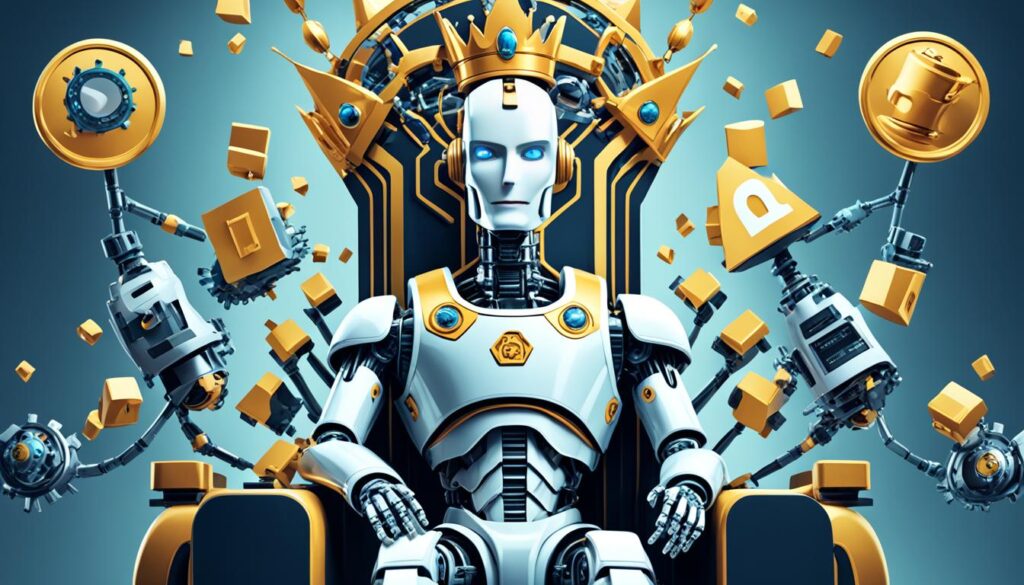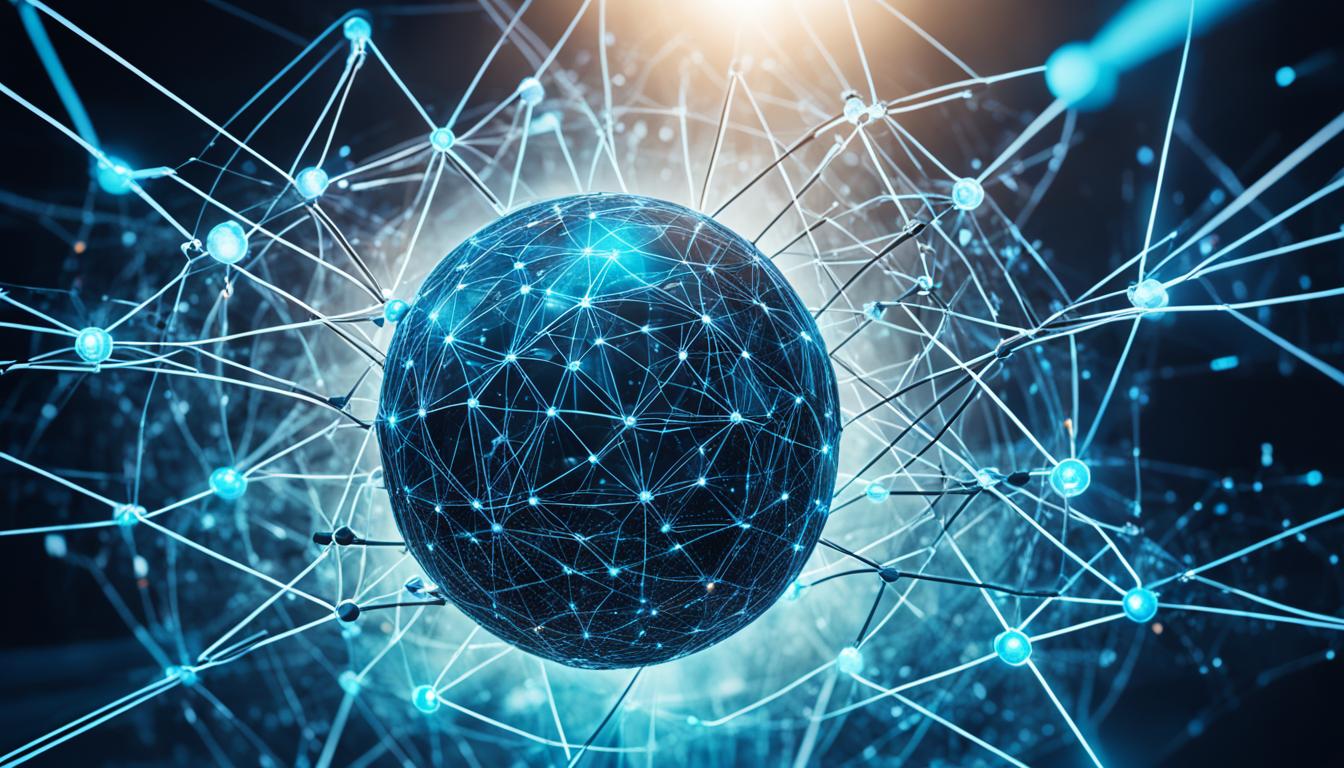Did you know that AI-driven governance is transforming the way decentralized organizations operate? In a Web3 world, where blockchain technology and AI merge, AI governance is playing a pivotal role in enhancing decision-making processes and ensuring transparency and accountability.
Through the integration of AI into decentralized autonomous organizations (DAOs), power is distributed among participants, creating a collaborative environment. AI facilitates fair and transparent voting mechanisms, identifies key decision-makers, and provides insights and recommendations based on data analysis. This AI-driven governance model enables entrepreneurs and innovators to navigate the Web3 world with a clear understanding of the possibilities and limitations, promoting rapid innovation and the advancement of decentralized organizations.
Key Takeaways:
- AI-driven governance is revolutionizing decision-making processes in decentralized organizations.
- AI-powered governance systems create fair and transparent voting mechanisms in DAOs.
- AI analyzes data to provide insights, recommendations, and identify key decision-makers.
- Implementing AI in DAOs enhances efficiency, transparency, and accuracy.
- Challenges such as ethical considerations and technical expertise need to be addressed when integrating AI into DAOs.
The Power of AI in DAOs
AI governance holds tremendous potential to transform the way decentralized autonomous organizations (DAOs) operate and make decisions. By integrating AI-powered governance systems, DAOs can establish fair and transparent decision-making mechanisms that ensure equal participation from all members. These systems not only automate processes but also guarantee transparency and security, enabling DAOs to thrive in the fast-paced world of Web3.
One of the key advantages of AI in DAOs is its ability to analyze vast amounts of data from multiple sources. By leveraging data from social media, news articles, financial reports, and other relevant channels, AI can provide valuable insights into the performance of the organization. These insights form the basis of data-driven decision-making, empowering DAOs to address challenges and seize opportunities effectively.
Furthermore, AI can help identify areas for improvement within DAOs. Through advanced analytics capabilities, AI can pinpoint bottlenecks, inefficiencies, or areas of potential growth, allowing DAOs to develop targeted strategies. Whether it’s optimizing resource allocation, enhancing member engagement, or improving operational processes, AI provides the analytical firepower necessary to drive continuous improvement within DAOs.
By harnessing the power of AI, DAOs can significantly enhance several aspects of their governance and decision-making processes:
- Efficiency: AI automation streamlines decision-making processes and reduces the time required for consensus. This enables DAOs to respond swiftly to changing market conditions and seize emerging opportunities.
- Transparency: AI-powered systems ensure that decisions are made based on objective data and predefined rules, promoting transparency and eliminating biases or favoritism.
- Accuracy: By analyzing a vast array of data, AI can provide accurate and reliable insights, enabling DAOs to make well-informed decisions that drive the organization forward.
It is worth noting that AI in DAOs is not meant to replace human decision-making entirely. Instead, it serves as a powerful tool that complements human expertise and enables collective intelligence. The combination of human judgment and AI-driven insights can unlock innovative solutions and foster inclusive decision-making processes within DAOs.
As AI continues to advance, the potential for AI governance in DAOs is immense. The ability to leverage AI-driven decision-making mechanisms can pave the way for more efficient, transparent, and intelligent organizations in the Web3 era.
| Benefits of AI in DAOs | Challenges of AI in DAOs |
|---|---|
|
|
While AI in DAOs presents its own set of challenges, including ethical concerns and technical requirements, embracing AI-driven governance can unlock a future where decentralized organizations operate with greater efficiency, transparency, and inclusivity.
Benefits and Challenges of AI in DAOs
The integration of AI in Decentralized Autonomous Organizations (DAOs) offers numerous benefits, revolutionizing the way these organizations operate and make decisions. By leveraging AI technologies, DAOs can enhance their efficiency, transparency, and accuracy in decision-making processes, leading to improved outcomes and increased trust among members.
Benefits of AI in DAOs
One of the key benefits of AI in DAOs is its ability to streamline decision-making processes and allocate resources more effectively. AI-powered algorithms can analyze massive amounts of data from various sources, such as social media, news articles, and financial reports, enabling DAOs to make data-driven decisions and optimize their operations.
Furthermore, AI promotes transparency within DAOs by providing insights into the decision-making process. With AI, members can gain a deeper understanding of how decisions are made, which builds trust and fosters a collaborative environment. By enhancing transparency, AI helps DAOs create a fair and inclusive governance model.
“AI in DAOs enhances decision-making processes, streamlining operations and promoting transparency among members.” – William Johnson, Blockchain Expert
Moreover, AI improves the accuracy of decision-making by analyzing vast amounts of data. Based on data-driven recommendations, DAOs can make informed choices that are more likely to result in favorable outcomes. This ensures that resources are allocated efficiently and that decisions align with the organization’s goals and objectives.
Challenges of AI in DAOs
While the benefits of AI in DAOs are significant, there are also several challenges to consider when implementing AI technologies.
Firstly, ethical considerations play a critical role in AI governance. Privacy concerns, data security, and algorithmic bias must be carefully managed to ensure that AI systems do not infringe upon individual rights or perpetuate discriminatory practices. DAOs need to establish robust ethical frameworks and protocols to address these issues and safeguard the interests of their members.
Secondly, developing and maintaining AI systems within DAOs requires technical expertise. AI technologies are constantly evolving, and organizations need skilled professionals who can navigate these advancements and keep their systems up to date. Investing in talent development and staying informed about the latest AI trends is essential to overcome this challenge.
Lastly, there are risks associated with using AI in DAOs. The decentralized nature of DAOs opens up the possibility of influence from bad actors who may attempt to manipulate AI systems for personal gain. In addition, the use of AI can inadvertently reinforce existing power structures if not carefully managed. DAOs must proactively address these risks and implement safeguards to prevent any misuse of AI technologies.
| Benefits of AI in DAOs | Challenges of AI in DAOs |
|---|---|
| Enhanced efficiency in decision-making processes | Ethical considerations – data privacy, algorithmic bias |
| Improved transparency and trust | Technical expertise required for development and maintenance |
| Increased accuracy through data-driven recommendations | Risks associated with influence from bad actors and reinforcement of power structures |

Conclusion
The future of AI in decentralized organizations is bright. The integration of AI into DAOs opens up new possibilities for governance and decision-making processes. By harnessing the power of AI, DAOs can enhance productivity, improve services, and enable shared ownership and control.
Despite the challenges of ethical considerations and technical expertise, the potential benefits of AI in DAOs outweigh the risks. As AI continues to advance, decentralized organizations have the opportunity to fully leverage its potential, transforming the way they operate and bringing communities together to achieve shared goals.
AI-driven governance in decentralized organizations paves the way for greater efficiency, transparency, and innovation. It empowers participants and creates a collaborative environment where decisions are based on data-driven insights. The future of AI in decentralized organizations is set to revolutionize the landscape, driving rapid innovation and fostering the growth of decentralized ecosystems.

Leave a Reply